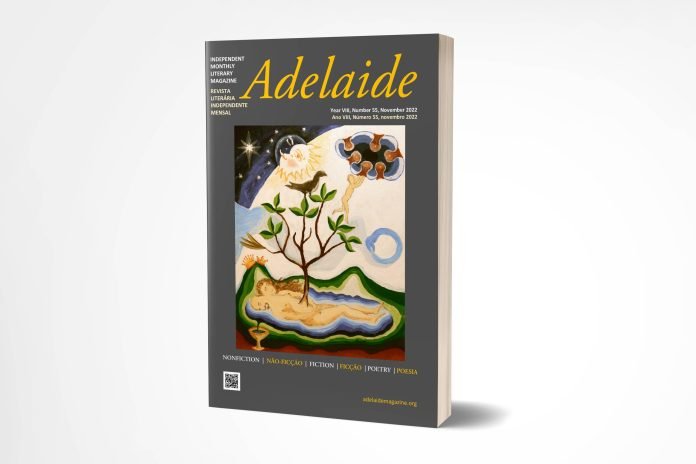Topography of the Historical Map
Others napped as the Rocky Mountain Sunday snow
drifted thick while we slow touched, increasingly
naked in the living room, gluing ourselves tight,
until together in the spring storm our eyes
grew large living with the surface explosion
seemingly trivial—comically short of official sex.
Only days later did we understand that passion
heats possibility—how unraveling coupled with air
and gentle light fuels a chemistry saying yes, yes, yes,
making us right then pregnant (together), with
a tiny kid waving from a great distance, while
we sat immersed in wonder, amazed, waiting. But
in the next weeks the hovering earth mothers said
no, no, no, this is a mistaken dead end for you
stumbling naïve teens so bent on flunking your future.
Then behind a calm plan, doors painted tropic blue
and orange slammed shut as we acquiesced,
and staggered hand in hand on a straight-line path
to the freeing Act. Later, smothered into silence,
we woke, knowing only to wound each other,
then drifted two thousand miles apart—along
the way spawning with other lovers in dark/light,
winter/spring, enmeshed in rich enough sagas,
living in our parallel lives. When new children
appeared, we sometimes reminded each other
how our conjoined bodies first chose one quiet
morning to conceive. But time out meditations
are not the same as living, and wildfire smoke
and hurricane winds fill decades, masking
the reality of what might have been, even what is.
Sometimes love on the historical map evolves
into nothing but desert—a bleached undeniable
topography, named, and real enough, like a kid’s
story filled with magic, but increasingly sun-faded,
slowly becoming indecipherable.
seek a truth that holds
in the crowded language thicket—then strike
at weasel words’ breeding bloat, for really fast is
not faster than fast, and no phase gains strength
smothered in cotton. Watch for chattering cousins
kind of and really that flare so briefly like plastic afire—
then shrink to nothing under the meditative light.
Always fresh morning cringes when really is voiced,
repulsed by the teenage impulse to exaggerate.
See how really clings, like a tick that sucks at essence,
making a phrase deflate, the head buried in blood.
Weak words drag a reader into waves eating away at
the surface, leaving the swimmer coated with salt, and tainted.
Lost in abstraction, sometimes even the professor can’t
articulate, as he struggles into clothes that don’t fit,
then uses the first words that appear. A phrase should fly,
subtle, like how a swallow-tail lifts gently from the zinnia,
then settles like destiny on beebalm. Language best
moves just right to the rhythm attuned to the pulse,
like how the afternoon builds the thunderhead, but
stalls like no drama is possible, then explodes
in a pounding deluge beyond all we imagined.
But even with diligence really and the weasel family
proliferate as an obscene habit—dangerous like
a sixth grader spewing profanity, acting out pretend sex—
so over the top the skin crawls. Look close at habits—
magnifying a fly into a big-eyed monster to see
its commonness unnatural, bizarre, the moments
we become the silly scientist creating a clone of a clone.
Stare with an awkward ache, embarrassed by what
we have become, knowing a scene is best left spare
and fresh, with God’s palpable gentle touch ready to caress.
Professor Prufrock Lands on Mars
Both the saint and the fool as he dissects the coed
with her back straight, demure in her tight sweater
so carefully arranged for this moment.
Scribbling again to his prompt, she looks up
excited, straight to him, confessing only for his eyes,
as he blinks, unable to keep the connection,
knowing from her writing the protective web
that sponsors her eager rebellion—feeds her
independence defiantly rejecting those who would judge.
His is a muted joy at being the leader of this crowd,
as he scans the class then returns to her, zeroing
in on how her breasts move, how she licks her lips,
arranges her head to mimic a mature woman’s
provocative intimacy. He sees himself as subtle
as he adjusts his classroom movie, cultivating
in his isolation chamber the jazz that blows
his hair awry, freezes him in youth, when once
upon a time (in his fiction) he would have stalled,
then acted upon these provocative cues—surely
staring straight into her soul—building a private
literature until her story wrapped tightly around his.
But today another script insists as he waits for
the stragglers to finish, so he can clear his throat
and bring them back together as the professional he is,
gesturing without thinking, so naturally tuning
a bebop rat-a-tap lesson so learning flows
and collects in the shallows. He knows already
that later, he will provoke a back-and-forth exchange,
and release quietly the well-honed anecdote
that brings their time together. But now he
finishes the editing lesson, modeling gentle
pronoun-agreement as she wriggles back into focus,
coloring so much of what he thinks remains
unstated, even as the class as a mood-driven
life force shifts like an ever-moving unstoppable river.
Out of nowhere appears the vivid frozen image,
fragile and still—a white egret on a muddy bank
poised on his scrawny legs. Himself, the teacher,
stares at the flashing multicolored minnow darting in
and around the boundaries he is too timid to cross.
Mark Vogel lives at the back of a Blue Ridge holler with his wife, Susan Weinberg, an accomplished fiction and creative non-fiction writer, and two foster sons. He is an Emeritus Professor of English at Appalachian State University in Boone, North Carolina.




















